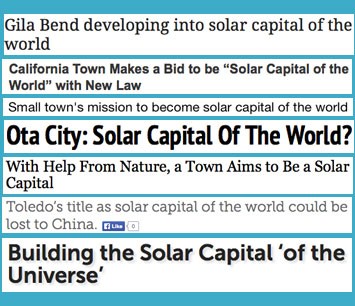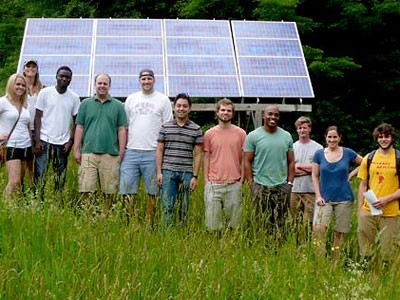One of the chief missions of this blog is to give “a kick in the butt” to business journalism. But it’s a tough balance. I want to kick without getting personal or discouraging otherwise good reporters and editors.
So without naming names, let me point to a headline I saw recently, “Gila Bend developing into solar capital of the world.”

For those who don’t know, Gila Bend is a woebegone little desert town southwest of Phoenix. Historically, it is so isolated and decrepit that nearby Casa Grande, which is hardly Paris (or even Paris, Texas), looks down its nose on Gila Bend. Nothing gets a native of Casa Grande more incensed than accidentally saying he is “from Gila Bend.”
Lately, Gila Bend has attracted solar farms, including the 280-megawatt Solana Generating Station. Soon, we are told, the town will have the capacity to generate 347 megawatts.
This doesn’t make it “the solar capital of the world.”
Even a casual understanding of the industry shows that the crown belongs to Germany, which in 2012 generated a record 22 gigawatts of electricity per hour, the equivalent of 20 nuclear power stations running at full capacity.
To be the capital, moreover, would require more then empty land and solar panels. It would mean Gila Bend would be a center of research and development, as well as manufacturing. It would be a world magnet for top talent and high-quality investments. It would have a national laboratory and the headquarters of global companies involved in every aspect of solar. None of this is going to happen in a state that invests little in science, has a largely disengaged congressional delegation, a sunshine-based economic-development “strategy” and where universities must fight for funding. Europe, and especially Germany, excel here and China is a major producer of photovoltaics.
Interestingly, the International Solar Energy Society was founded in Phoenix in 1954, but Arizona let this organization and energy technology get away. Its headquarters is in Freiburg, Germany.
The story did not discuss problems with certain kinds of solar arrays, such as the need for water to keep them cool or to clean off dust that can degrade their capacity. As with most such coverage, notably about America’s “fracking boom,” it didn’t get into the nettlesome issue of “energy in/energy out” (EIEO). In other words, how much energy through fossil fuels is required to produce this renewable energy and how much of it is a net gain? Finally, I failed to find a voice discussing the environmental damage to the desert and controversy that many solar projects have attracted.
We all have bad days.
But avoid superlatives. Use restrained language. Provide context and history. Look for the other side. For example, there’s nothing wrong with letting boosters say they want to be the solar capital of the world, while mentioning the headwinds such an achievement would face.
Go ahead, rain on their parade. It will provide more authoritative, compelling coverage.











